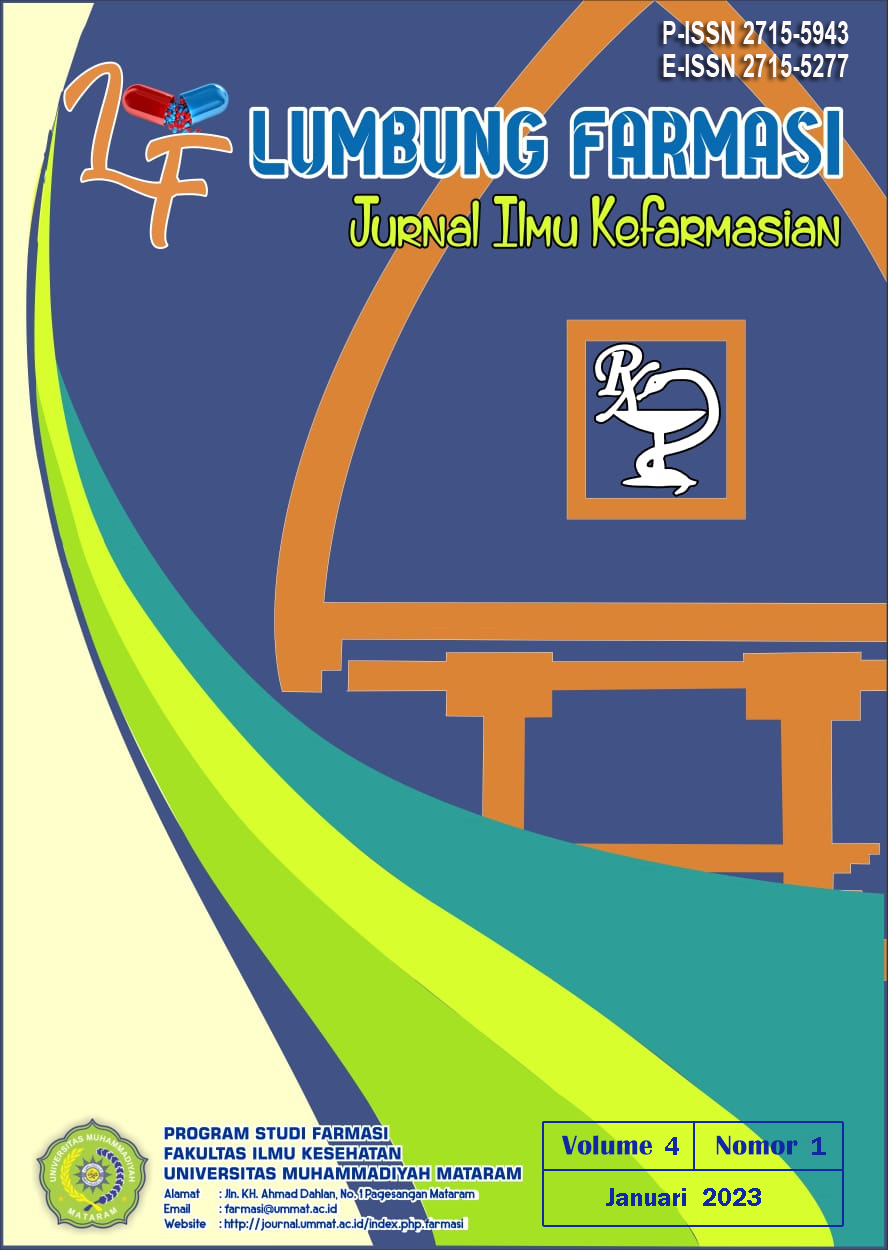Hubungan Tingkat Pengetahuan Dengan Perilaku Masyarakat Dalam Mengelola Obat Rusak Dan Kedaluwarsa Di RW 009 Desa Sukaragam
DOI:
https://doi.org/10.31764/lf.v4i1.11113Keywords:
Knowledge Behavior Destructive Drugs Expired DrugAbstract
In everyday life, people using and storage the medicines at home for self-medication. Of the stored drugs, some drugs are unused properly and to much only stored for a long period of time, causing damage to the drugs and the drugs accumulates to the limit of expiration. The aims of this study to analyze the relationship between the level of knowledge and the behavior of the people of RW 009 Sukaragam Village in managing destructive drugs and expired drugs at home. This research type a analytic survey research with a Cross Sectional observational design approach which was carried out in the community of RW 009 Sukaragam Village. The method of sampling used is Cluster Sampling. The sample size of 91 was calculated use the Slovin formula with a precision of 10% (0,1). The instrument used a questionnaire. The research was conducted from March-May 2022. In the results of data analysis, respondents with good knowledge category were 29 (31,9%), enough 44 (48,4%) and 18 (19,8%) less and respondents with positive behavior category 65 (71,4%), negative 26 (28,6%). In the results of bivariate data analysis using the Chi Square test, the results obtained p-value 0.064 (p-value >0.05), then the interpretation used is Ha is rejected and H0 is accepted. Based on this research, it can be concluded that there is no significant relationship between the level of knowledge and community behavior in managing damaged and expired drugs in RW 009 Sukaragam Village.
References
Arikunto, S. (2011). Prosedur Penelitian : Suatu Pendekatan Praktik (VI). Rineka Cipta.
Azwar, S. (2011). Sikap Manusia: Teori dan Pengukuran. Pustaka Pelajar.
Banwat, S. B., Auta, A., Dayom, D. W., & Buba, Z. (2016). Assessment of The Storage and Disposal of Medicines in Some Homes in Jos North Local Government Area of Plateau State, Nigeria. Tropical Journal of Pharmaceutical Research, 15(5), 989–993.
BPOM. (2015). Gerakan Nasional Peduli Obat dan Pangan Aman (GNPOPA) Edukasi terkait OBAT pada Remaja dan Dewasa. Badan Pengawa Obat dan Makanan.
Budiman & Riyanto A. (2013). Kuesioner Pengetahuan Dan Sikap Dalam Penelitian Kesehatan. Salemba Medika.
Departemen Kesehatan, RI. (2006). Pedoman Penggunaan Obat Bebas dan Bebas Terbatas.epartemen Kesehatan,
Herawati, F. (2012). Beyond Use Date (BUD). Buletin Rasional Vol.10 Nomor.3, 16–24.
Kemenkes RI. (2013).Riset Kesehatan Dasar 2013.
Kemenkes RI. (2020a). Pedoman Pelaksanaan Program Gerakan Masyarakat Cerdas Menggunakan Obat (GeMa CerMat). In Kemenkes RI.
Kemenkes RI. (2020b). Pedoman Pengelolaan Obat Rusak Dan Kedaluwarsa Di Fasilitas Pelayanan Kesehatan Dan Rumah Tangga
Martins, R. R., Farias, A. D., Oliveira, Y. M. da C., Diniz, R. D. S., & Oliveira, A. G. (2017). Prevalence and Risk Factors of Inadequate Medicine Home Storage: A Community-Based Study. Revista de Saude Publica, 51, 95.
Miège, C., Choubert, J. M., Ribeiro, L., Eusèbe, M., & Coquery, M. (2009). Fate of Pharmaceuticals and Personal Care Products in Wastewater Treatment Plants - Conception of A Database and First Results. Environmental Pollution, 157(5), 1721–1726.
Notoatmodjo, S. (2005). Promosi Kesehatan Teori Dan Aplikasi (Cetakan Pe). PT Rineka Cipta.
Notoatmodjo, S. (2007). Promosi Kesehatan Dan Ilmu Perilaku. Rineka Cipta.
Notoatmodjo, S. (2010). Metodologi Penelitian Kesehatan. Rineka Cipta.
Savira, M., Ramadhani, F. A., Nadhirah, U., Lailis, S. R., Ramadhan, E. G., Febriani, K., Patamani, M. Y., Savitri, D. R., Awang, M. R., Hapsari, M. W., Rohmah, N. N., Ghifari, A. S., Majid, M. D. A., Duka, F. G., & Nugraheni, G. (2020). Praktik Penyimpanan Dan Pembuangan Obat Dalam Keluarga. Jurnal Farmasi Komunitas, 7(2), 38.
WHO. (2007). Who Medicines Starategy, Countries At the Core 2004-2007. In Geneva: World Health Organization. 2004 (Vol. 109, Issue 7).

